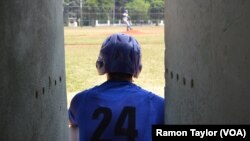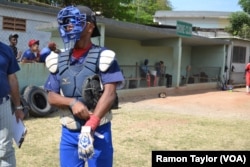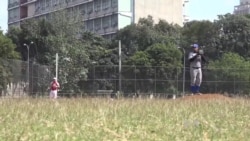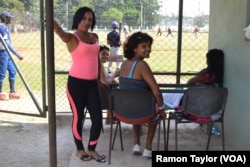Atop roofs and through chain-linked fences, a dozen spectators – half of them mothers – gather to watch and cheer as their young boys, mostly in their late-teens and early-20s, compete for the ultimate prize: a chance to represent the "Industriales," one of the most revered (and hated) teams in Cuban baseball, often compared to the New York Yankees of Major League Baseball (MLB).
José Hernán, a catcher representing one of Havana’s three municipality teams on the field of Estadio 50 Aniversario, says baseball is to Cuba as football (soccer) is to Brazil.
"From the day you’re born, you have a baseball in hand, headed toward the stadium,” he said.
Ultimate dream
Hernán, who sports a Boston Red Sox cap during play, says his ultimate dream is to one day play in the majors, calling it an opportunity that anyone would welcome.
"Everyone wants to play at that level,” he said.
There are exceptions, however, including ex-pitcher Lázaro Luis de la Torre – one of only four 200-game national series winners in Cuba since the Castro Revolution – who has since become a youth development trainer.
De la Torre says he could have fled to the United States to seek a multimillion-dollar contract with the majors during his prime, but decided against it.
In Cuba, he said, one can still be a millionaire; that is, in having millions of devoted fans.
Dangerous path to success
The path to Major League Baseball, to this point, has not been easy. Cuban players currently in the league – including New York Mets’ Yoenis Cespedis and Miami Marlins’ José Fernandez – risked their lives in order to escape Cuba and seek a more prosperous life in the U.S.
In addition to the risks of human trafficking, Cuban players who enter the U.S. are forced to renounce their Cuban citizenship if they wish to join the majors – a set of practices that batting coach Fidel García says has caused suffering for the Cuban people.
The U.S. trade embargo, he argues, should be lifted so that citizens can stop “endangering themselves" in the ocean.
WATCH: 'We live for it here'
Hernán, for his part, argues that by lifting the embargo, more Cubans may one day play in MLB through the fall, and still return for Cuba’s winter league. Doing so, he says, would create greater publicity for the Cuban National Series.
Waiting game
Still, many obstacles remain. Despite U.S. President Barack Obama’s scheduled attendance at an exhibition game between MLB’s Tampa Rays and the Cuban national team Tuesday in Havana’s 55,000-capacity Estadio Latinoamericano, laws pertaining to American business in Cuba, including Major League Baseball contracts, cannot be lifted through executive action.
Unless U.S. Congress acts to lift the trade embargo currently in place – an event that remains highly unlikely under prevailing leadership – players, coaches and fans are left with only one choice: continue to play the game as it has done for 55 years.
For players’ biggest fans, like Dayami Martinez, the mother of 3rd-base infielder Daniel Rosely, baseball will always be Cuba’s first sport. To this day, she remembers giving her son a plastic bat and ball for the first time – "one of his first toys."
What she wants for her son, she added, is something most mothers – fans and non-fans alike – might typically want for their children: “that he reaches his highest potential.”
“That’s my dream,” Martinez said.








